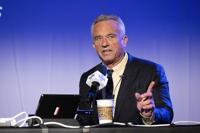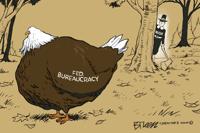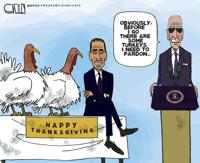A Georgia sheriff was sued last week for allegedly blocking critical comments on his office’s social media account after videos spread of him calling deputies to a Burger King that botched his order.
David Cavender, who lost the Cobb County sheriff’s race to incumbent Craig Owens Sr. this month, sued Owens weeks after kicking off a stream of online ridicule against the sheriff by accusing him of “Whoppergate.”
In mid-October, Cavender’s campaign published body-camera footage of a March 2023 incident where Owens, who was not in uniform, called three deputies to a Mableton, Georgia, Burger King and asked them to collect the names of the store’s manager and owner so he could lodge a complaint with the restaurant.
Cavender accused Owens of misusing public resources. He and others blasted the sheriff in the comments of the Cobb County Sheriff’s Office’s Facebook posts. On Oct. 29, a week before the election, Owens restricted comments on several posts on the page, according to Cavender’s complaint.
The lawsuit, filed Nov. 13 in U.S. District Court for the Northern District of Georgia by Cavender and two other plaintiffs critical of Owens, accuses the sheriff of violating their constitutional rights to free expression and speech. The accusation echoes similar lawsuits against higher-profile public officials, including then-President Donald Trump and Rep. Alexandria Ocasio-Cortez (D-New York), for blocking critics on social media.
Attorneys for Owens did not immediately respond to a request for comment Thursday evening on the lawsuit or the Burger King incident. The Cobb County Sheriff’s Office declined to comment.
The sheriff’s office said in a Nov. 1 Facebook post that it had restricted comments on its page to “keep our posts focused on community safety updates and educational info.”
Owens called three officers to the Burger King after the restaurant botched his wife’s Whopper order, according to the body-camera footage first published by Cavender’s campaign and later obtained by local news outlets. Owens was not in uniform and appeared to be driving a personal truck.
“Do me a favor,” Owens asks a deputy on the video. “All I need is the owner name … or the manager. We ordered something, the food was wrong.”
Owens told his deputy that the restaurant’s staff disputed that they served the wrong order and declined to refund him, according to the video. He said he wanted the name of the restaurant’s owner to file an official complaint.
Video shows the deputies approach the Burger King to find the doors locked. An assistant manager told the deputies that staff had locked the doors because they felt threatened by Owens after previous experiences with angry customers, according to Atlanta-area TV station 11Alive, which viewed unpublished portions of the video showing the interaction.
“You didn’t tell him who I was, did you?” Owens asks his deputy after the officers return and tell him that the staff felt threatened, according to the footage. The deputy says he didn’t.
Cavender’s campaign published the body-camera footage on social media on Oct. 11 and said Owens had abused his position and wasted county resources by calling deputies to the scene. Owens apologized and said he had made the same kind of request over a business dispute that any citizen could make, and that he did not identify himself as the sheriff to the Burger King staff, Atlanta-based TV station WSB-TV reported.
Comments on the Cobb County Sheriff’s Office Facebook page ridiculing Owens - including images of the sheriff in a Burger King hat - soon followed. In Facebook comments, Cavender also leveled criticism at Owens over other controversies, including the death of an inmate at the Cobb County Jail, according to his lawsuit.
On Oct. 29, the sheriff’s office began restricting comments on several recent Facebook posts that had been swamped with criticism, according to the lawsuit. It limited comments on new posts going forward and deleted many of the critical comments left on the old posts, the lawsuit alleges.
Cavender’s lawsuit also accuses Owens of pushing the policy to hide negative comments on posts lauding the department’s work. It further alleges that Owens published laudatory posts about the sheriff’s office in October to bolster his reelection chances.
Owens, a Democrat, defeated Cavender, a Republican, in November. Cobb County, a suburban county near Atlanta, has reliably leaned blue in recent election cycles.
The lawsuit alleges that Owens violated Cavender’s First Amendment rights by blocking him from commenting and removing his previous comments. Similar cases brought in 2019 against Trump and Ocasio-Cortez, both of whom blocked critics on social media, led the officials to backtrack and remove the blocks.
But the question of whether any public officials are allowed to censor critical voices online remains a subject of legal controversy; two other First Amendment cases involving local officials in California and Michigan went all the way to the Supreme Court. The high court wrote in March that public officials retain the constitutional right to maintain private social media accounts and block critical voices on them, but can still be sued for blocking users if they purport to exercise their authority to “speak on the state’s behalf” or carry out official business on those accounts - a standard some legal experts said was unclear, The Post reported.
Owens told WSB-TV he could have handled the Burger King dispute differently.
“In hindsight, I probably should have just drove off and took the bad service and left and came back another day,” he said.













